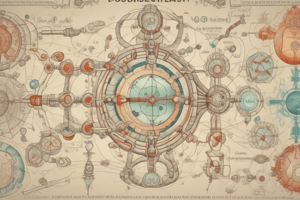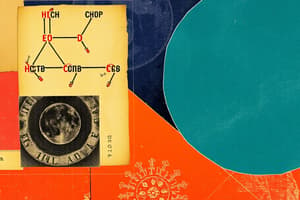Podcast
Questions and Answers
What hormone is secreted by the pancreas to lower blood sugar levels?
What hormone is secreted by the pancreas to lower blood sugar levels?
- Glucagon
- Insulin (correct)
- Aldosterone
- Epinephrine
Which hormone regulates sodium content in the blood?
Which hormone regulates sodium content in the blood?
- Testosterone
- Glucagon
- Aldosterone (correct)
- Epinephrine
What is one effect of glucagon on blood glucose levels?
What is one effect of glucagon on blood glucose levels?
- Inhibits gluconeogenesis
- Decreases blood glucose levels
- Increases glucose intake in cells
- Stimulates breakdown of glycogen in the liver (correct)
Which hormone is responsible for the 'fight or flight' response?
Which hormone is responsible for the 'fight or flight' response?
In diabetes mellitus, what happens when there is insufficient insulin?
In diabetes mellitus, what happens when there is insufficient insulin?
What is the function of calcitonin?
What is the function of calcitonin?
What type of hormone communication is involved when blood sugar is high and cells need to take up sugar?
What type of hormone communication is involved when blood sugar is high and cells need to take up sugar?
Which hormone is responsible for promoting glucose uptake by cells?
Which hormone is responsible for promoting glucose uptake by cells?
Which category of hormone is aldosterone classified under?
Which category of hormone is aldosterone classified under?
What is one possible cause of endocrine hypofunction?
What is one possible cause of endocrine hypofunction?
Flashcards
Endocrine System
Endocrine System
The body system that uses hormones to control and coordinate various functions.
Hormones
Hormones
Chemical messengers produced by glands that travel through the bloodstream and affect distant locations.
Hormone Classification (Proteins)
Hormone Classification (Proteins)
Hormones like insulin and thyroid-stimulating hormone, made of amino acid chains.
Endocrine Hypofunction
Endocrine Hypofunction
Signup and view all the flashcards
Endocrine Communication
Endocrine Communication
Signup and view all the flashcards
What is the pancreas's role in blood sugar control?
What is the pancreas's role in blood sugar control?
Signup and view all the flashcards
What is glycogenesis?
What is glycogenesis?
Signup and view all the flashcards
What is gluconeogenesis?
What is gluconeogenesis?
Signup and view all the flashcards
Describe ketosis.
Describe ketosis.
Signup and view all the flashcards
Diabetes Mellitus
Diabetes Mellitus
Signup and view all the flashcards
Study Notes
Endocrinology
- Endocrinology is the study of hormones and glandular abnormalities, including diabetes and thyroid problems.
- Hormones are biologically active substances secreted by glands.
- Endocrine hormones have a biological effect far away from their source.
- Paracrine hormones have a biological effect nearby.
- Autocrine hormones have a local effect.
Hormone Classification
- Proteins: thyroid-stimulating hormone, insulin, parathyroid hormone
- Amino acids: thyroid hormone, epinephrine
- Steroids: cortisol, aldosterone, testosterone
Mechanism of Action of Hormones
- Hormones circulate in the bloodstream, either bound to transporter proteins or free.
- Free hormones are the active form.
- Hormones enter cells to alter biological activity.
Endocrine Glands
- The diagram shows various glands in the body, including the pituitary, thyroid, parathyroid, adrenal, pancreas, ovaries (female), and testes (male).
Endocrine Hypofunction
- Causes of endocrine hypofunction include congenital defects in hormone biosynthesis, autoimmune destruction of glands, surgery or trauma to glands, and infiltration by tumors or infection.
Coordination of Body Functions
- Body functions are coordinated through various systems, including the nervous system (neurotransmitters), the endocrine system (hormones), neuroendocrine (neurohormones), paracrines (secreted into extracellular fluid), autocrines (affecting the same cells), and cytokines (peptides like interleukins, lymphokines, and adipokines).
Blood Sugar Regulation
- High blood sugar requires communication to stimulate body cells to take up sugar
- This is achieved primarily through endocrine communication
Hormone Functions
- Growth and development: Thyroid, growth hormone (GH), sex steroids, cortisol
- Reproduction: Estrogen, testosterone, follicle-stimulating hormone (FSH), luteinizing hormone (LH), thyroid
- Homeostasis: Thyroid, cortisol, insulin
- Environmental changes: Cortisol, thyroid, aldosterone
Endocrine Hormones
- A table lists various glands, their hormones, and associated functions.
Homeostasis and Hormones
- Examples of homeostasis regulated by hormones include thyroid and temperature control; thyroid, parathyroid, and calcium regulation; and pancreas and glucose control.
Pancreas
- Combination organ: exocrine tissues (acini) secrete digestive enzymes into the small intestine, while endocrine tissues secrete hormones (e.g., insulin, glucagon, somatostatin)
- Processes associated with the pancreas include glycogenolysis and gluconeogenesis.
Pancreas (Hormones and Effects)
- A table lists pancreatic hormones and their target tissues along, with their major effects:
- Insulin: targets all cells (particularly in liver, muscle, and fat); effects: stimulates cellular glucose uptake, increased glycogen synthesis, protein and fat synthesis, and decreases blood glucose.
- Glucagon: targets alpha cells in the pancreas; effect: stimulates hepatic glycogenolysis (breakdown) and gluconeogenesis(production of glucose from other sources), increasing blood glucose.
- Somatostatin: targets alpha and beta cells in the pancreas; effect: suppresses secretion of glucagon and insulin.
Disorders of the Pancreas: Diabetes Mellitus
- Diabetes Mellitus is a disorder of glucose metabolism.
- Type I: Insulin deficiency (juvenile onset, closely related to heredity)
- Type II: Insulin resistance (adult onset, related to heredity and obesity).
- Symptoms of untreated type I and II diabetes include polydipsia, polyuria, polyphagia, weight loss, and weakness.
- Severe cases may lead to ketosis or diabetic ketoacidosis
Diabetic Emergencies
- A table details diagnostic signs associated with various diabetic emergencies.
Conclusions
- Hormones are vital for normal growth, development, metabolism, energy, and reproduction
- Hormones are tightly regulated by various systems.
- Hormone imbalances (over or underproduction) cause clinical problems.
Studying That Suits You
Use AI to generate personalized quizzes and flashcards to suit your learning preferences.




